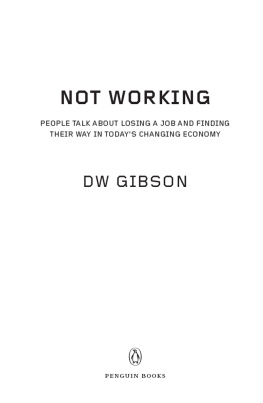PENGUIN BOOKS
NOT WORKING
DW Gibson has written for The New York Times, The New York Observer, BOMB, and Tin House and worked on documentaries for MSNBC and A&E. He lives in New York City.
NOT WORKING
PEOPLE TALK ABOUT LOSING A JOB AND FINDING
THEIR WAY IN TODAYS CHANGING ECONOMY
DW GIBSON

PENGUIN BOOKS
PENGUIN BOOKS
Published by the Penguin Group
Penguin Group (USA) Inc., 375 Hudson Street, New York, New York 10014, U.S.A.
Penguin Group (Canada), 90 Eglinton Avenue East, Suite 700, Toronto,
Ontario, Canada M4P 2Y3 (a division of Pearson Penguin Canada Inc.)
Penguin Books Ltd, 80 Strand, London WC2R 0RL, England
Penguin Ireland, 25 St Stephens Green, Dublin 2, Ireland (a division of Penguin Books Ltd)
Penguin Group (Australia), 250 Camberwell Road, Camberwell,
Victoria 3124, Australia (a division of Pearson Australia Group Pty Ltd)
Penguin Books India Pvt Ltd, 11 Community Centre,
Panchsheel Park, New Delhi 110 017, India
Penguin Group (NZ), 67 Apollo Drive, Rosedale, Auckland 0632,
New Zealand (a division of Pearson New Zealand Ltd)
Penguin Books (South Africa) (Pty) Ltd, 24 Sturdee Avenue,
Rosebank, Johannesburg 2196, South Africa
Penguin Books Ltd, Registered Offices:
80 Strand, London WC2R 0RL, England
First published in the United States of America by OR Books 2012
Published in Penguin Books 2012
1 3 5 7 9 10 8 6 4 2
Copyright DW Gibson, 2012
All rights reserved
ISBN: 978-1-101-61344-3
Printed in the United States of America
Except in the United States of America, this book is sold subject to the condition
that it shall not, by way of trade or otherwise, be lent, resold, hired out, or otherwise
circulated without the publishers prior consent in any form of binding or cover other
than that in which it is published and without a similar condition including
this condition being imposed on the subsequent purchaser.
The scanning, uploading, and distribution of this book via the Internet or via any
other means without the permission of the publisher is illegal and punishable
by law. Please purchase only authorized electronic editions, and do not
participate in or encourage electronic piracy of copyrighted materials.
Your support of the authors rights is appreciated.
ALWAYS LEARNING
PEARSON
To those who contributed to the story, with gratitude
and to Tasha who makes each day a blessing, with love.
All that each person is, and experiences, and shall never experience, in body and in mind, all these things are different expressions of himself and of one root, and are identical: and not one of these things nor one of these persons is ever quite to be duplicated, nor replaced, nor has it ever quite had precedent: but each is a new and incommunicably tender life, wounded in every breath, and almost as hardly killed as easily wounded: sustaining, for a while, without defense, the enormous assault of the universe
James Agee
Vagabond Breakdown
Outside the collection of people I interviewed, there are various iterations of we, and Ill enumerate when necessary but in the end all that is important is weagain and again, and always. In the spirit of Agee, and in alignment with my never-ending pursuit of efficiency, here is a complete billing (in alphabetical order):
Mallery Avidon, collaborator, playwright, information fountain and haiku master.
Beluh, the Jeep: 1999 model, red, 140,000 miles and no air-conditioning, always questionable, mostly sturdy.
Ella, the dog (Pomeranian): honey colored and generally an accompaniment of Tasha Garcia Gibson.
Tasha Garcia Gibson, collaborator, wife, champion aesthete, shuttling back and forth between the road and a steady job.
DW Gibson, instigator.
MJ Sieber, collaborator and filmmaker, always finding light and depth.
Over the summer and fall of 2011 we drove across the country from Southern California to New York City. We occupied blistering hot sidewalks, trying to catch people outside unemployment offices; we attended church services where congregations provided guidance for the unemployed; we stalked business reporters, distant relatives, and recognizable facebook friends, trying to find those who were laid off in the five year span from 2007-2011, those who would be willing to tell the story of the day they lost that job, the circumstances that led up to it, and the consequences that followed.
We met these collaborators in libraries, parking lots, fast-food restaurants, homes, union halls, fellowship halls, cheap motel rooms, coffee shops and barswherever someone with a story preferred to sit and talk. The majority claimed that they or their particular experienceor bothwere boring. And most people began with a 45-second version of their story. Id ask a few questions and theyd tell a five-minute version. Then a few more questions and soon enough the most precise detail of the story had been reachedand it was often tethered to the biggest idea or strongest emotion or both. The unfurled version of each story lasted anywhere from 45 minutes to several days. Over the course of that time, a handful of generous collaborators invited us to eat and even sleep in their homes. Some did laundryinsisted on doing laundry. All of this and they were willing to tell a stranger a personal story they would likely prefer to forget.
Since it was work that had been lost, and work that was sought, I ended every conversation by asking each person how he or she defines the word work. Here is a sample of what these Americans have lostand what they seek:
Pride
Security
Self-worth
Self-esteem
A paycheck
A career
A challenge
A reward
A roof overhead
Bread on the table
Adventure
Labor
Blood, sweat & tears
A place to go
Stability
Life
Energy
Creativity
Results
Purpose
Nurture
Responsibility
Fun
Joy
Identity
Dignity
The Precariat
This is the story of becoming unemployed through no fault of ones own, due to circumstances beyond ones control. Thats an exact but twisty sentence designed to avoid all of these words and phrases: laid off, excessed, downsized, surplused, separated, sacked, terminated, reorganized, released, reallocated, managed out, fired, let go, discontinued, displaced, discharged, dissolved, RIFd, canned, hosed, and blown out. This is the language used by the people who endured it, and none of the verbs fully serve the experience of having your work, identity, livelihood, and dignity swept out from underneath you. As one Human Resources manager put it, There is no way to say it so that anyone can hear anything but you dont want me here anymore.
Layoff seems to be the most commonly used word despiteor maybe because ofa passivity that cheats the impact of the experience. As recently as 1989, the Oxford English Dictionary defined layoff as a spell of relaxation; a period during which a workman is temporarily dismissed or allowed to leave his work. This book does not contain spells of relaxation, and not one person characterizes the event as something he or she was allowed to do. It is something new, the layoff, and something ubiquitous; as the writer Louis Uchitelle puts it, it has become a mass phenomenon of American life.
Despite capitalisms propensity for exciting tension between ownership and labor, for much of the 20th century the thrust of American labor practices had been toward lasting attachments of employers to workers and vice versa, Uchitelle writes in
Next page





